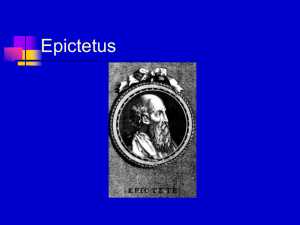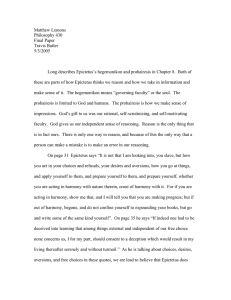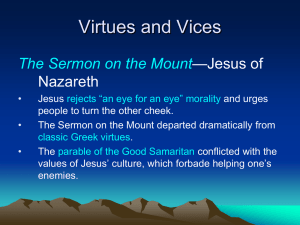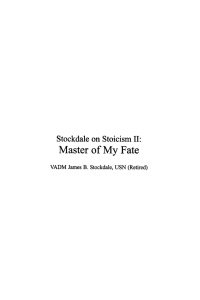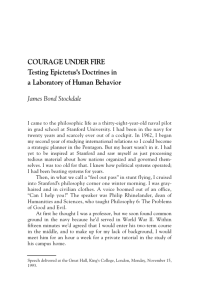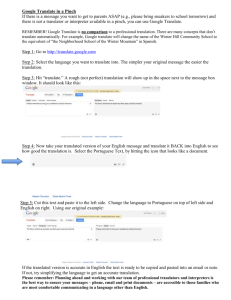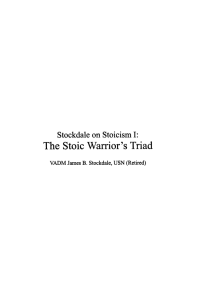THE TRANSLATION
advertisement
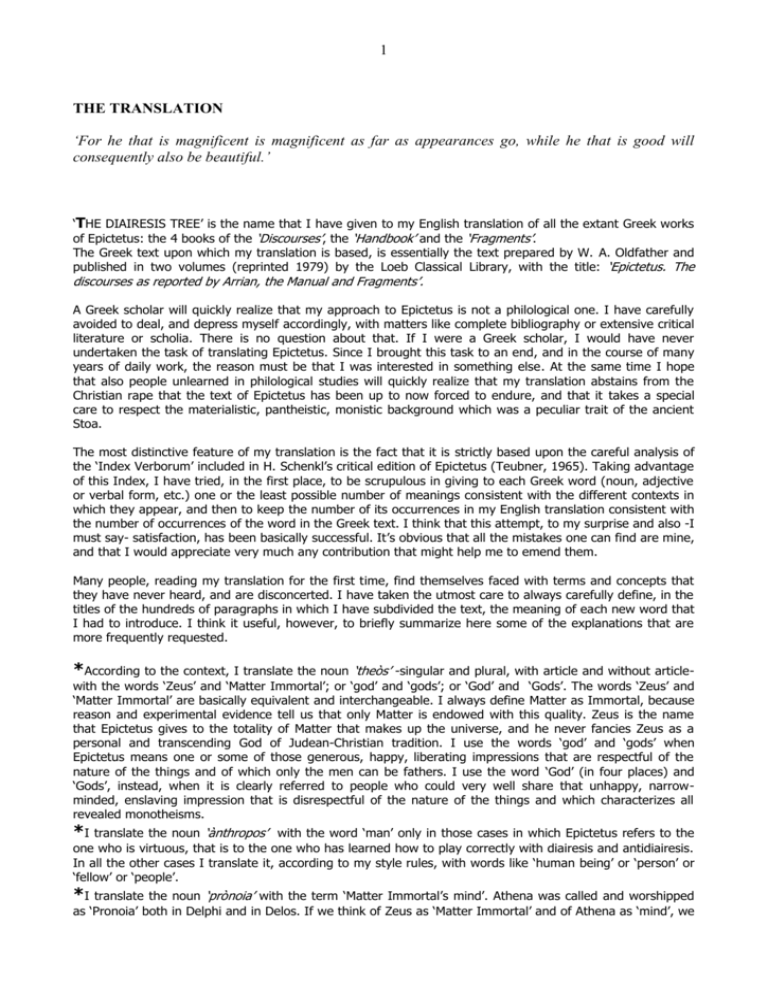
1 THE TRANSLATION ‘For he that is magnificent is magnificent as far as appearances go, while he that is good will consequently also be beautiful.’ ‘THE DIAIRESIS TREE’ is the name that I have given to my English translation of all the extant Greek works of Epictetus: the 4 books of the ‘Discourses’, the ‘Handbook’ and the ‘Fragments’. The Greek text upon which my translation is based, is essentially the text prepared by W. A. Oldfather and published in two volumes (reprinted 1979) by the Loeb Classical Library, with the title: ‘Epictetus. The discourses as reported by Arrian, the Manual and Fragments’. A Greek scholar will quickly realize that my approach to Epictetus is not a philological one. I have carefully avoided to deal, and depress myself accordingly, with matters like complete bibliography or extensive critical literature or scholia. There is no question about that. If I were a Greek scholar, I would have never undertaken the task of translating Epictetus. Since I brought this task to an end, and in the course of many years of daily work, the reason must be that I was interested in something else. At the same time I hope that also people unlearned in philological studies will quickly realize that my translation abstains from the Christian rape that the text of Epictetus has been up to now forced to endure, and that it takes a special care to respect the materialistic, pantheistic, monistic background which was a peculiar trait of the ancient Stoa. The most distinctive feature of my translation is the fact that it is strictly based upon the careful analysis of the ‘Index Verborum’ included in H. Schenkl’s critical edition of Epictetus (Teubner, 1965). Taking advantage of this Index, I have tried, in the first place, to be scrupulous in giving to each Greek word (noun, adjective or verbal form, etc.) one or the least possible number of meanings consistent with the different contexts in which they appear, and then to keep the number of its occurrences in my English translation consistent with the number of occurrences of the word in the Greek text. I think that this attempt, to my surprise and also -I must say- satisfaction, has been basically successful. It’s obvious that all the mistakes one can find are mine, and that I would appreciate very much any contribution that might help me to emend them. Many people, reading my translation for the first time, find themselves faced with terms and concepts that they have never heard, and are disconcerted. I have taken the utmost care to always carefully define, in the titles of the hundreds of paragraphs in which I have subdivided the text, the meaning of each new word that I had to introduce. I think it useful, however, to briefly summarize here some of the explanations that are more frequently requested. *According to the context, I translate the noun ‘theòs’ -singular and plural, with article and without article- with the words ‘Zeus’ and ‘Matter Immortal’; or ‘god’ and ‘gods’; or ‘God’ and ‘Gods’. The words ‘Zeus’ and ‘Matter Immortal’ are basically equivalent and interchangeable. I always define Matter as Immortal, because reason and experimental evidence tell us that only Matter is endowed with this quality. Zeus is the name that Epictetus gives to the totality of Matter that makes up the universe, and he never fancies Zeus as a personal and transcending God of Judean-Christian tradition. I use the words ‘god’ and ‘gods’ when Epictetus means one or some of those generous, happy, liberating impressions that are respectful of the nature of the things and of which only the men can be fathers. I use the word ‘God’ (in four places) and ‘Gods’, instead, when it is clearly referred to people who could very well share that unhappy, narrowminded, enslaving impression that is disrespectful of the nature of the things and which characterizes all revealed monotheisms. *I translate the noun ‘ànthropos’ with the word ‘man’ only in those cases in which Epictetus refers to the one who is virtuous, that is to the one who has learned how to play correctly with diairesis and antidiairesis. In all the other cases I translate it, according to my style rules, with words like ‘human being’ or ‘person’ or ‘fellow’ or ‘people’. *I translate the noun ‘prònoia’ with the term ‘Matter Immortal’s mind’. Athena was called and worshipped as ‘Pronoia’ both in Delphi and in Delos. If we think of Zeus as ‘Matter Immortal’ and of Athena as ‘mind’, we 2 can easily understand the accuracy and the clearness of the ancient myth that tells us something about her birth. Few things can be more alien to Epictetus and to myself than the idea of a transcending and Christian Providence. *The noun ‘fùsis’, besides its usual meaning of ‘nature’, takes very often in the present text the more technical meaning of ‘nature of the things’, and I have translated it in this way where I thought it necessary. This is a very important question because, together with the concepts of ‘Proairesis’ and of ‘Diairesis’, this is one of the pillars of the philosophy of Epictetus that have been till now dramatically underestimated or completely disregarded by all translators in whatever language. Epictetus knows very well how easy it is to misunderstand this point and how big the danger is of passing off as ‘nature’ what is, on the contrary, a simple ‘cultural model’. He never plays this game. At the same time, he points out very firmly that we can and we must talk about the ‘nature of the things’, and he is adamant in telling us that ‘the nature of the things’ is invariant, inviolable and valid for all human beings without exceptions. The ‘nature of the things’ is, eventually, their essential bipartition in things that are in our exclusive power (‘proairetic things’) and things that are not in our exclusive power (‘aproairetic things’). *I never translate the noun ‘paidèia’ with the simple word ‘education’, because this word could lead to the same misunderstandings that I mentioned for the word ‘nature’. I regularly translate it, instead, with the term ‘training to diairesis’ or ‘training to diairesize’, because this is the only interpretation that, in my opinion, is coherent with the general philosophical system of Epictetus and is also clearly the goal that he sets to himself as educator. *I translate the verb ‘thélo’ with the verb ‘to want’, mostly in those cases in which Epictetus uses it ironically or makes fun of people who don’t know very well, as the saying goes, what they want. Epictetus is adamant in constantly reaffirming that we are ‘our judgements’ or ‘our proairesis’, so that the concept of ‘will’, although not unknown, is mostly useless to him. Except for few cases, I have therefore translated this verb with the English verb ‘to dispose’, a verb that, in my opinion, incorporates the precious meaning of an act of our intellect, useful to comply with the strong dislike of Epictetus for any chat about a presumed contradiction, in man, between theory and praxis. This English translation of Epictetus has been written in Aluthgama (Sri Lanka), Singapore (Singapore), Pulau Pangkor (Malaysia), Bangkok (Thailand), Gili Trawangan (Indonesia), Paihia (New Zealand), Nadi (Fiji Islands), Lalomanu (Western Samoa), Ofu (American Samoa), Los Angeles (California, USA), Key West (Florida, USA), Turin (Italy), Athens (Greece).
